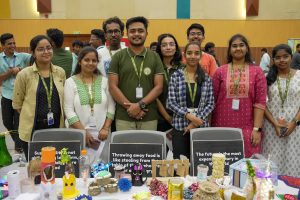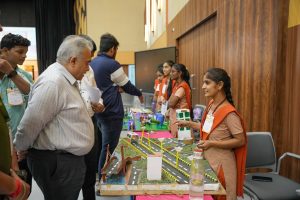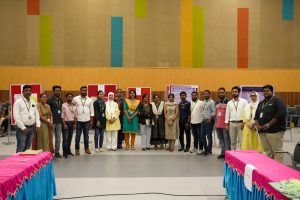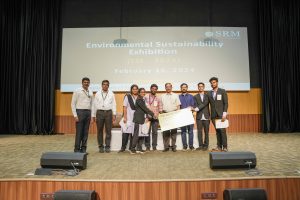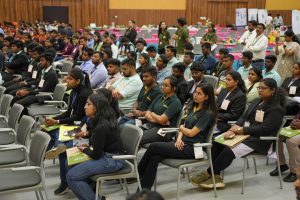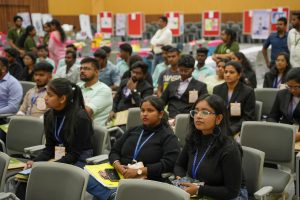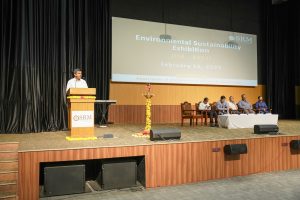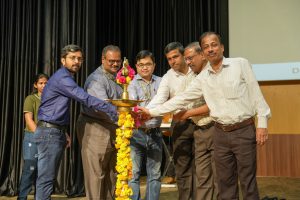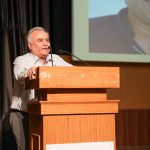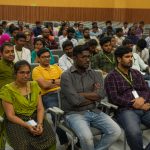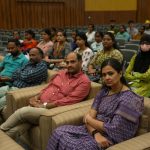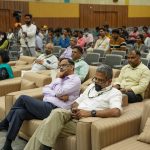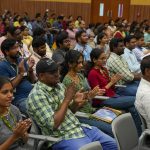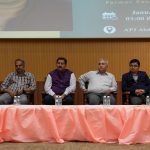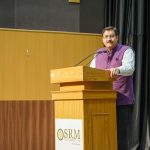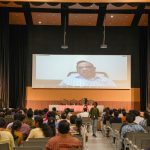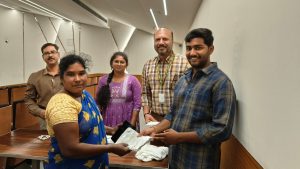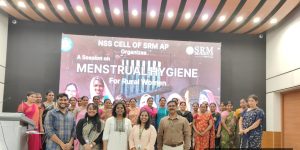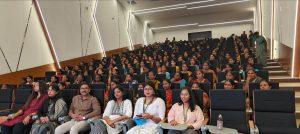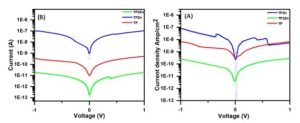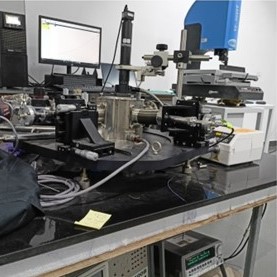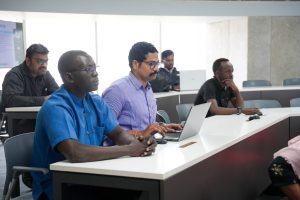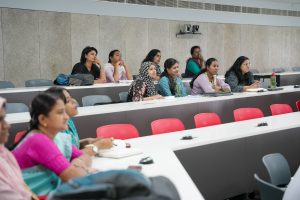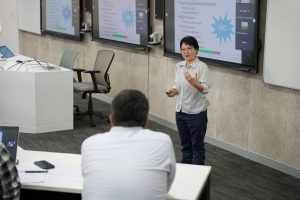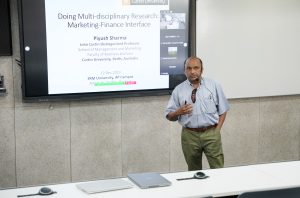SRM AP and TITAN COMPANY LIMITED Jointly Filed an Industrial Patent
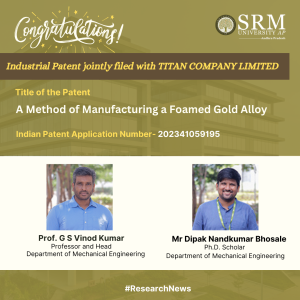 SRM University-AP and TITAN COMPANY LIMITED, a leading jewellery brand in India, have collaborated to engineer novel jewellery products using advanced materials and technologies. The joint research project, led by HOD Prof. G S Vinod Kumar and Ph.D. Scholar Dipak Nandkumar Bhosale, Department of Mechanical Engineering, has resulted in a new method of manufacturing foamed gold alloy that is lighter, stronger, and more durable than conventional gold jewellery.
SRM University-AP and TITAN COMPANY LIMITED, a leading jewellery brand in India, have collaborated to engineer novel jewellery products using advanced materials and technologies. The joint research project, led by HOD Prof. G S Vinod Kumar and Ph.D. Scholar Dipak Nandkumar Bhosale, Department of Mechanical Engineering, has resulted in a new method of manufacturing foamed gold alloy that is lighter, stronger, and more durable than conventional gold jewellery.
A joint patent between SRM University-AP and TITAN COMPANY LIMITED has been filed for this innovative method of manufacturing foamed gold alloys. The jewellery products made from this material are currently available in TITAN showrooms under the brand name TANISHQ. The customers can enjoy the benefits of wearing lightweight and high-strength jewellery, which also has a high aesthetic appeal and value.
The collaboration between SRM University-AP and TITAN COMPANY LIMITED exemplifies how academia and industry can work together to create novel and useful products for society. The joint research project also provides an opportunity for the students and faculty of SRM University-AP to gain exposure and experience in the field of jewellery engineering and design and to contribute to advancing science and technology.
Abstract
The current innovation introduces a method for producing foamed gold alloy utilising a liquid metallurgical approach. Gas-releasing agents such as hydrides and carbonates are employed in the manufacturing process. Both 18K and 22K alloys are subjected to foaming in this invention. The resulting foams are stabilised by oxides generated in-situ as well as oxides added externally. These foamed gold alloys exhibit ultra-lower density. The foaming process is successfully executed using both interrupted and uninterrupted methods. These foamed gold alloys find applications in various fields including Jewellery and medical implants.
The title of patent in the citation format
“G. S. Vinod Kumar, Dipak Nandkumar Bhosale. A METHOD OF MANUFACTURING A FOAMED GOLD ALLOY. Indian Patent application number 202341059195 filed Sep 04, 2023”
Patent Application number
202341059195
Inventors
1. G. S. Vinod Kumar 2. Dipak Nandkumar Bhosale
- Published in Departmental News, Mechanical Engineering NEWS, News, Research News
Journey Through Time: Discovering BA History Course Details
Unearthing Histories: Explore BA History Course Details
History is the majestic tapestry upon which humanity paints its legacy. It’s a canvas woven with tales of triumphs, conflicts, and the evolution of societies. Studying history isn’t merely peering into the past; it’s an odyssey through the corridors of time, a journey that unveils the secrets of civilisations and the threads that connect the present to the bygone eras. It’s the cornerstone of understanding our world’s complexities. It is a multidimensional exploration that dissects the past through diverse lenses.
A Bachelor of Arts (BA) in History is an undergraduate degree programme focusing on the study of the past, exploring events, societies, cultures, and their evolution over time. Typically, it involves coursework covering various periods, regions, and themes in history. This course is a gateway to unravelling the mysteries of culture, power, and human behaviour, illuminating pathways to comprehend the present and shape the future. Also, it provides a foundation for various career paths, as mentioned earlier, by cultivating transferable skills highly valued in multiple sectors.
Moreover, movie houses have a high demand for history experts who can conduct research on costumes, jewellery, and movie sets. Collaborating closely with directors and cinematographers, these experts may also pursue roles as research analysts in production houses. Let’s dive into BA History course details.
BA History Course Details
BA History Eligbility:
The typical eligibility requirements for a Bachelor of Arts (BA) in History include:
- Completion of 10+2 or an equivalent from a recognized board like CBSE or ICSE
- Attainment of at least 50% aggregate marks in the qualifying examination
- Acceptance of students from any academic stream into the BA History program
- Some universities might stipulate prior study of History at the 10+2 level.
Preference is often given to candidates from a Humanities background. Individual institutes may have unique eligibility criteria. For instance, DU Admissions mandates that applicants have passed Mathematics at the qualifying level.
BA History Duration:
The BA History programme spans three years and delves into the evolution of human civilization across ancient to modern eras. Exploring diverse cultures, it scrutinizes both the accomplishments and shortcomings, unravelling the tapestry of achievements and setbacks throughout history.
Jobs After BA History
A BA in History can open doors to various career paths due to the skills it develops, such as critical thinking, research, analysis, and communication. Some career options include:
- Museum Curator/Archivist
- Historical Researcher
- Education
- Journalism/Writing
- Government & Public Service
- Librarian
- Heritage Manager
- Consultancy/Analysis
Many careers might require further education, specialized training, or internships. Consider supplementing your BA with internships, certifications, or even pursuing higher education like a Master’s or Ph.D. in History or related fields to enhance your prospects in certain career paths.
BA (Hons) in History at SRM University-AP – Nurturing Legacy Explorers
The School of Liberal Arts and Social Sciences at SRM AP presents a BA (Hons.) in History, aiming to provide students with comprehensive knowledge of global and Indian history. The programme challenges the conventional view of history as a mere chronicle of dates and personalities.
Emphasizing diverse perspectives on historical events encourages critical thinking and analysis. Through intensive reading and tutorial sessions, students engage deeply with historical texts, fostering a nuanced understanding. Evaluation at SRM University-AP emphasizes presentations, ensuring a dynamic and insightful exploration of the multifaceted nature of history.
BA History Subjects List at SRM University-AP
Semester 1:
• Art of Listening, Speaking, and Reading Skills
• Environmental Science
• Digital Literacy
• Understanding Indian Society(ies): Myths and Realities
• Understanding the Indian Constitution
• Understanding Human Minds
• Emerging Technologies
Semester-2:
• Effective Writing and Presentation Skills
• Universal Human Values and Ethics
• Analytical Reasoning and Aptitude
• Economics in Everyday Life
• Data Analytics for Social Sciences
• Human Civilizations
Semester-3:
• Creative and Critical Thinking Skills
• Co-Curricular Activities
• Community Service and
• Social Responsibility
• Entrepreneurial Mindset
• Middle Ages in Europe
• European Social Formations
Semester-4:
• Leadership and Teamwork
• Community Service and Social Responsibility
• Social Entrepreneurship
• Early Medieval India
• Medieval India (1200-1500)
• History of Central Islamic Lands
• Age of Revolutions and National Liberation
Semester-5:
• Community Service and Social Responsibility
• Career Skills- I
• Medieval India – II
• Introduction to Colonial Latin America and the Caribbean
• Economic History of Modern India (1757-1947)
Semester-6:
• Community Service and Social Responsibility
• Entangled Histories
• Understanding Caste
• Society, Politics, and Economy: India After Independence
• Introduction to Colonial Africa
Semester 7 & 8:
• Seminars and Dissertation
Wrapping Things Up
Take up an illuminating journey through the annals of time with SRM University-AP’s BA (Hons) History programme. The multidimensional curriculum doesn’t just decode the past; it fosters critical thinking and analysis. Join the university to explore diverse perspectives and unveil the rich tapestry of history. Embrace a future shaped by a nuanced understanding of civilizations. Start your transformative journey by applying today.
- Published in Academics, Blog, Liberal Arts
ESE 2024: Promoting Environmental Sustainability Through Innovation
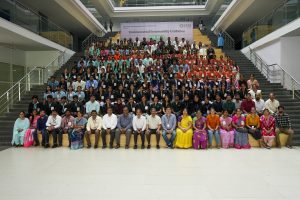 In a remarkable display of commitment towards environmental sustainability, the Department of Environmental Science and Engineering successfully organised the ESE 2024 event. The primary objective of this event was to create awareness and encourage innovative solutions for addressing environmental challenges.
In a remarkable display of commitment towards environmental sustainability, the Department of Environmental Science and Engineering successfully organised the ESE 2024 event. The primary objective of this event was to create awareness and encourage innovative solutions for addressing environmental challenges.
More than 150 enthusiastic undergraduate students from Gujarat, West Bengal, Uttarakhand, Odisha and Tamil Nadu participated in the event. Their active involvement exemplified the youth’s growing interest and concern for environmental issues.
After a highly competitive and captivating competition, the winners were finally announced. The first prize was awarded to Andhra Loyola College, the second prize went to Natubhai V. Patel College of Pure Applied Sciences, and the third prize was claimed by Government Autonomous College, Rourkela.
The winners were not only recognised for their outstanding performances but also received substantial cash prizes. The first-place winner was awarded a cash prize of INR 30,000/-, the second-place winner received INR 20,000/-, and the third-place winner was granted INR 10,000/-.
Additionally, consolation prizes of INR 5,000/- each were distributed to students securing positions from 4th to 10th. Recipients included students from Manipal Academy of Higher Education, Doon Business School, Saveetha Institute of Medical and Technical Sciences (SIMATS), Central University of Tamil Nadu, Sri Durga Malleswara Siddhartha Mahila Kalasala, Nehru Arts and Science College, and SRR & CVR Govt. Degree College.
The ESE 2024 event served as a platform for young minds to showcase their talents and exchange ideas, engage in meaningful discussions, and collaborate on initiatives aimed at promoting environmental sustainability. The exhibition featured a diverse range of projects spanning areas such as renewable energy, waste management, conservation efforts, and sustainable agriculture, among others.
- Published in Departmental News, ENVS News, News
Dr Dhamodharan Invited for Workshop on Youth Leadership
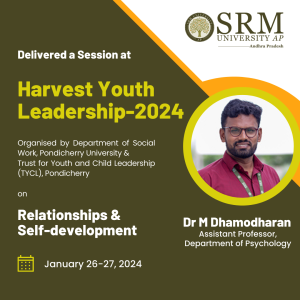 Dr M Dhamodharan, Assistant Professor in the Department of Psychology, was invited as a resource person to deliver a session on “Relationship and Self Development “from January 26-27, 2024, at the Two Days workshop on “Harvesting Youth Leadership-2024.”The workshop was organised by the Department of Social Work at Pondicherry Central University in collaboration with the Trust for Youth and Child Leadership (TYCL), Pondicherry.
Dr M Dhamodharan, Assistant Professor in the Department of Psychology, was invited as a resource person to deliver a session on “Relationship and Self Development “from January 26-27, 2024, at the Two Days workshop on “Harvesting Youth Leadership-2024.”The workshop was organised by the Department of Social Work at Pondicherry Central University in collaboration with the Trust for Youth and Child Leadership (TYCL), Pondicherry.
Dr Dhamodharan’s expertise and insights on the topic added value to the workshop, which aimed to empower young individuals and cultivate leadership skills among the youth. The session provided a platform for participants to delve into the dynamics of relationships and personal growth, essential aspects for nurturing effective leadership qualities.
His contribution towards the event underscored the importance of understanding the link between relationships and self-development in the context of youth leadership.
Abstract
Relationship is a continuing and often committed association between two or more people, as in a family, friendship, marriage, partnership, or other interpersonal links in which the participants influence each other’s thoughts, feelings, and actions (APA,2020).
The connections we set up, the several types of love we meet, and the effects these interactions have on our personal development all have a significant impact on how we live as people. Understanding the many kinds of relationships that exist is the first step in any analysis of relationships.
Every sort of relationship, whether it be sexual or platonic, professional or familial, has its own dynamics, obstacles, and expectations. In the context of human relationships, love manifests as a complex and profound energy. Love affects the core of who we are and transcends cultural barriers in all its manifestations. Numerous love typologies have been proved by academics and psychologists to classify and understand these types. Love has many sides, ranging from the Greek concepts of Agape, Eros, and Philia to contemporary psychiatric theories. This investigation looks at the subtle differences between various kinds of love, emphasising the behavioural, cognitive, and emotional aspects of each.
A foundational work in the field of psychology, Sternberg’s Triangular Theory of Love is at the core of understanding love. According to this theory, love can be viewed as a triangle made up of three essential elements: commitment, passion, and intimacy. It explores the significance of each ingredient and how they interact to shape the different manifestations of love through a thorough investigation of Sternberg’s theory. The talk explains the practical applications, providing a window into how the theory may be used to understand and negotiate the intricacies of real-world interactions.
Furthermore, a comprehensive knowledge of the human experience requires the inclusion of self-development in the conversation about love and relationships. In all their manifestations, relationships function as mirrors that reflect our advantages, disadvantages, and potential growth areas. The reciprocal effects of relationships, love kinds, and self-development are particularly important in human life. Also explains. how people change because of their relationships, moulding and honing their identities to fit the demands of romantic relationships and close relationships.
Finally, this session might give light on the complex interactions that exist between self-development, Sternberg’s Triangular Theory, love categories, and relationship types. Participants may understand more about the complex interplay between love and personal development as well as the enormous impact that connections have on forming our identities by exploring these interconnected domains. This talk might give insightful guidance for the participants to navigating the intricate web of interpersonal interactions, supplying a road map for cultivating meaningful connections and promoting comprehensive self-development.
- Published in Departmental News, News, Psychology News
UDL on Scientific Progress and Market Paradigms by Dr Girish Sahni
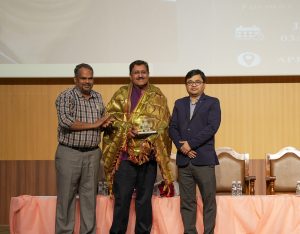 SRM University-AP proudly hosted the seventeenth edition of the University Distinguished Lecture series on the topic “Scientific Progress to Grand Progression: Opportunities and Challenges in Science-to-Technology-to-Market Paradigms.” The event took place on January 25, 2024, and featured an enlightening address by Dr Girish Sahni, Former Director General of CSIR and Former Secretary of the Government of India.
SRM University-AP proudly hosted the seventeenth edition of the University Distinguished Lecture series on the topic “Scientific Progress to Grand Progression: Opportunities and Challenges in Science-to-Technology-to-Market Paradigms.” The event took place on January 25, 2024, and featured an enlightening address by Dr Girish Sahni, Former Director General of CSIR and Former Secretary of the Government of India.
The lecture centered around the dynamic relationship between scientific progress and its translation into marketable technologies. Dr Girish Sahni shed light on the immense opportunities and challenges that arise in the process of transforming scientific advancements into tangible solutions for society. He emphasised the crucial role of imagination and concentration in fostering innovation, which ultimately leads to groundbreaking inventions. Dr Sahni’s thought-provoking discourse resonated with the audience, inspiring them to embrace curiosity and innovation in their pursuit of scientific excellence.
Following the lecture, an engaging Q&A session allowed the attendees to further explore the nuances of the topic and seek clarification on various aspects of science-to-technology-to-market paradigms. The interactive session fostered an environment of intellectual exchange and provided valuable opportunities for the audience to engage.
Reflecting on the significance of the University Distinguished Lecture, Prof. Manoj K Arora, Vice Chancellor of SRM University-AP, remarked, “The lecture by Dr Girish Sahni illuminated the critical role of scientific progress in driving grand progression. It highlights the opportunities and challenges that lie before us in translating scientific advancements into meaningful technological solutions that can benefit society at large”.
The event was skillfully moderated by Dr Sutharsan Govindarajan, Assistant Professor, Department of Biological Sciences. Dr J P Rajapandiyan, Assistant Professor of Chemistry, expressed his appreciation for the enlightening lecture delivered by Dr Girish Sahni. He highlighted the significance of such platforms in fostering a culture of research and innovation within the university and beyond. Prof. Ranjit Thapa, Dean of Research, and Dr Vinayak Kalluri, Dean of Academic Affairs, presented a memento on behalf of the institution as a token of respect and appreciation for his esteemed presence at the seventeenth edition of the University Distinguished Lecture series.
This event stands as a testament to SRM University-AP‘s dedication to academic excellence and its ongoing efforts to provide students and faculty with enriching opportunities for intellectual growth and exploration.
- Published in News, Research News
A Scholarly Perspective on Incumbency to Dominance
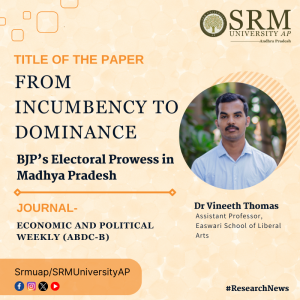 We are pleased to announce the publication of an insightful article titled “From Incumbency to Dominance: BJP’s Electoral Prowess in Madhya Pradesh,” in the prestigious ABDC-B journal, Economic and Political Weekly (EPW). This article, authored by Dr Vineeth Thomas, Assistant Professor in the Easwari School of Liberal Arts provides a comprehensive analysis of the BJP’s journey from being an incumbent party to establishing dominance in the state’s political landscape.
We are pleased to announce the publication of an insightful article titled “From Incumbency to Dominance: BJP’s Electoral Prowess in Madhya Pradesh,” in the prestigious ABDC-B journal, Economic and Political Weekly (EPW). This article, authored by Dr Vineeth Thomas, Assistant Professor in the Easwari School of Liberal Arts provides a comprehensive analysis of the BJP’s journey from being an incumbent party to establishing dominance in the state’s political landscape.
Dr Thomas examines the factors that have contributed to the BJP’s electoral success in Madhya Pradesh, including the party’s organisational strength, leadership, and strategic alliances. The article also delves into the impact of various government policies and initiatives on the BJP’s electoral performance in the state.
Dr Thomas’s expertise in political analysis and his meticulous approach to the subject matter make this article a significant contribution to the scholarly discourse on Indian politics, particularly within the context of Madhya Pradesh. This research also enriches our understanding of contemporary political landscapes and aligns with our commitment to academic excellence.
Congratulations to Dr Vineeth Thomas for this impactful contribution to political scholarship!
Abstract
In the 2023 Madhya Pradesh Assembly election, the Bharatiya Janata Party (BJP) emerged victorious with a landslide majority. This electoral triumph, characterised by a significant mandate for the BJP, has undoubtedly reshaped the political dynamics of Madhya Pradesh. The landslide victory underscores the party’s stronghold in the region and signals a decisive mandate for the BJP to govern the state for the designated term. In this context, this article analyses various strategic factors that cleared the BJP’s path from incumbency to dominance in Madhya Pradesh.
Explanation of Research in Layperson’s Terms
In the dynamic landscape of Indian politics, Madhya Pradesh stands as a crucible of electoral battles, where the ebb and flow of political tides have shaped the destiny of the state. At the heart of this electoral competition lies the Bharatiya Janata Party (BJP), an entity that has not only weathered the storm of time but has also evolved from being a political contender to establishing unwavering dominance in Madhya Pradesh.
The 2023 Madhya Pradesh Assembly election results revealed a clear mandate in favour of the BJP, securing an impressive 164 out of the total 230 seats. The overwhelming success is underscored by its triumph across different regions of the state. This comprehensive victory is particularly pronounced in the Malwa-Nimar region, which holds significant tribal populations. In this crucial area with 66 seats, the BJP secured a dominant 45 seats, leaving the Congress trailing with 20 seats, while the Bahujan Adhikar Party (BAP) clinched a lone seat. The BJP’s prowess is further evident in the Bundelkhand region, where it nearly swept the electoral landscape, securing 21 out of 26 seats, while the Congress was left with just five. Similarly, in the Vindhya region, the BJP emerged victorious in 25 out of 30 seats, leaving the Congress with a mere five. This regional dominance is a testament to the party’s strategic appeal and resonant policies. The saffron wave extended to Madhya Bharat, where the BJP outshone the Congress by winning a staggering 33 out of 36 seats (Malpani,2023). This substantial margin of victory indicates not only the party’s organisational strength but also its ability to connect with the electorate on a regional level.
So, how did the BJP complete the journey from a party in power to a political behemoth that has left an indelible mark on the state’s political canvas? A close examination in this regard unravels the fact that it is the conglomeration of clearly designed multiple tactics which gave the BJP a winning formula in the 2023 Madhya Pradesh assembly elections
Title of the Research Paper in Citation Format
Saravanan, Vineeth & Avunii, From incumbency to dominance. (2024, January 5). Economic and Political Weekly.
Practical Implementation/ Social Implications of the Research
Policy makers and politicians can make prudent decision about one nation one election
Collaborations
Electoral Politics, ethics, commonwealth
Future research plans
Indian govt and politics
- Published in Departmental News, Liberal Arts News, News, Research News
NSS Cell Illuminates Women on Menstrual Hygiene
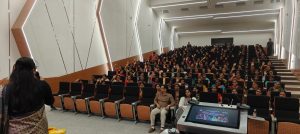 In a dedicated effort towards community welfare, the NSS Cell of SRM University-AP orchestrated a transformative awareness session on Menstrual Hygiene for rural women. Delivered by our esteemed University Counsellors, the session aimed to empower and educate women from nearby villages on essential menstrual hygiene practices.
In a dedicated effort towards community welfare, the NSS Cell of SRM University-AP orchestrated a transformative awareness session on Menstrual Hygiene for rural women. Delivered by our esteemed University Counsellors, the session aimed to empower and educate women from nearby villages on essential menstrual hygiene practices.
The engaging session delved into addressing the challenges faced by these women and dispelling myths surrounding menstruation. Harnessing the power of videos and captivating story narrations, the University Counsellors brought forth crucial information to raise awareness about this natural biological process.
Despite menstruation being a universal phenomenon, many rural women grapple with inadequate knowledge and resources, resulting in health complications, social stigma, and daily life limitations. The NSS Cell’s initiative sought to bridge this knowledge gap and provide practical insights.
Despite menstruation being a universal phenomenon, many rural women grapple with inadequate knowledge and resources, resulting in health complications, social stigma, and daily life limitations. The NSS Cell’s initiative sought to bridge this knowledge gap and provide practical insights.Through impactful story narrations, the session aimed to instill a sense of empowerment and confidence among the women, enabling them to manage menstruation with dignity. The Counsellors addressed prevalent myths surrounding menstruation, fostering an environment of openness, and understanding to eliminate social stigmas. Utilizing the visual medium, informative videos were showcased to provide a comprehensive understanding of menstrual hygiene practices. The overarching goal of this initiative was to ensure that every woman, irrespective of her background, gains access to vital information and resources for a healthier, stigma-free life.
SRM University-AP remains committed to its role as a catalyst for positive change, uplifting communities, and fostering holistic well-being.
- Published in Departmental News, News, student affairs news
Unveiling a Realm of Possibilities in the Field of Material Science
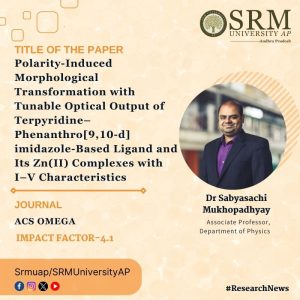 Dr Sabyasachi Mukhopadhyay, Associate Professor in the Department of Physics at SRM University-AP recently published a paper, titled “Polarity-Induced Morphological Transformation with Tunable Optical Output of Terpyridine–Phenanthro[9,10-d] imidazole-Based Ligand and Its Zn(II) Complexes with I–V Characteristics,” in the prestigious journal “ACS Omega.” Notably, “ACS Omega” is a Q1 journal with an impact factor of 4.1. This groundbreaking work delves into the polarity-induced morphological transformations and tunable optical outputs of Terpyridine–Phenanthro[9,10-d] imidazole-based ligands and their Zn(II) complexes. The study also explores their I–V characteristics, contributing valuable insights to the realms of materials science and chemistry.
Dr Sabyasachi Mukhopadhyay, Associate Professor in the Department of Physics at SRM University-AP recently published a paper, titled “Polarity-Induced Morphological Transformation with Tunable Optical Output of Terpyridine–Phenanthro[9,10-d] imidazole-Based Ligand and Its Zn(II) Complexes with I–V Characteristics,” in the prestigious journal “ACS Omega.” Notably, “ACS Omega” is a Q1 journal with an impact factor of 4.1. This groundbreaking work delves into the polarity-induced morphological transformations and tunable optical outputs of Terpyridine–Phenanthro[9,10-d] imidazole-based ligands and their Zn(II) complexes. The study also explores their I–V characteristics, contributing valuable insights to the realms of materials science and chemistry.
Abstract
Self-assembled nanostructures obtained from various functional π-conjugated organic molecules have been able to draw substantial interest due to their inherent optical properties, which are imperative for developing optoelectronic devices, multiple-color-emitting devices with color-tunable displays, and optical sensors. These π-conjugated molecules have proven their potential employment in various organic electronic applications. Therefore, the stimuli-responsive fabrication of these π-conjugated systems into a well-ordered assembly is extremely crucial to tuning their inherent optical properties for improved performance in organic electronic applications.
To this end, herein, we have designed and synthesized a functional π-conjugated molecule (TP) having phenanthrol [9,10-d] imidazole with terpyridine substitution at the 2 position and its corresponding metal complexes (TPZn and (TP)2Zn). By varying the polarity of the self-assembly medium, TP, TPZn, and (TP)2Zn are fabricated into well-ordered superstructures with morphological individualities. However, this medium polarity-induced self-assembly can tune the inherent optical properties of TP, TPZn, and (TP)2Zn and generate multiple fluorescence colors.
Particularly, this property makes them useful for organic electronic applications, which require adjustable luminescence output. More importantly, in a 10% aqueous-THF medium, TPZn exhibited H-type aggregation-induced white light emission and behaved as a single-component white light emitter. The experimentally obtained results of the solvent polarity-induced variation in optical properties as well as self-assembly patterns were further confirmed by theoretical investigation using density functional theory calculations. Furthermore, we investigated the I− V characteristics, both vertical and horizontal, using ITO and glass surfaces coated with TP, TPZn, and (TP)2Zn, respectively, and displayed maximum current density for the TPZn-coated surface with the order of measured current density TPZn > TP > (TP)2Zn.
This observed order of current density measurements was also supported by a direct band gap calculation associated with the frontier molecular orbitals using the Tauc plot. Hence, solvent polarity-induced self-assembly behavior with adjustable luminescence output and superior I−V characteristics of TPZn make it an exceptional candidate for organic electronic applications and electronic device fabrication.
Research Explanation
Our investigation is based on the electron transport characteristics of molecules (voltage vs. current), which allows us to ascertain the molecule’s conductive capacities. The Janis probe station, which has four gold tips total is the primary instrument utilized in this investigation. To investigate the properties of electron transport, two gold tips were used: one in contact with an aluminum electrode and the other with an ITO surface. The current measurements for a given voltage of given molecules have been studied using a source measuring unit.
Application
- Our research study can be applicable to predict the good electron and hole transport layers for the Organic Light Emitting Diode (OLED) application.
- Organic field effect transistor (OFET) applications.
Collaborations
Dr. Priyadip Das, Associate Professor, Department of Chemistry,SRMIST
Pictures related to research
- Published in Departmental News, News, Physics News, Research News
Exploring Frontiers in 5-day FDP by Centre for Consumer Research
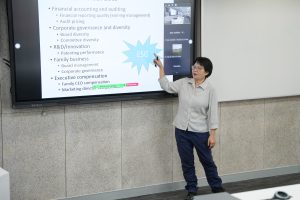 Centre for Consumer Research in India, under the aegis of Paari School of Business, recently organised a dynamic and contemporary five-day Faculty Development Program. This innovative program delved into cutting-edge topics, showcasing the forefront of consumer research.
Centre for Consumer Research in India, under the aegis of Paari School of Business, recently organised a dynamic and contemporary five-day Faculty Development Program. This innovative program delved into cutting-edge topics, showcasing the forefront of consumer research.
The hybrid-mode FDP witnessed enthusiastic participation from all PhD students and faculty members of PSB, fostering a vibrant environment of knowledge exchange. What added to the richness of this academic endeavor was the inclusion of 20 participants from various other prestigious B-schools.
Distinguished anchors for the FDP included luminaries in the field like Prof. Raj Sethuraman from Cox School of Business, Southern Methodist University; Prof. Ramkumar Janakiraman from Darla Moore School of Business, University of South Carolina; Prof. Piyush Sharma from the School of Management and Marketing, Curtin University, Australia; Prof. Tak Yan Leung, Associate Professor, School of Business and Creative Industries, University of the Sunshine Coast, Australia; Prof. Bharadhwaj Sivakumaran, Dean, Paari School of Business.
Speakers talked about new technologies in omni channel retail and big data in retailing, empirical models in Marketing. Then, Professors Piyush Sharma and Tak Yan Leung gave individual and personalized feedback to all participants on their research. Finally, Prof. Bharadhwaj Sivakumaran gave tips on how to publish papers on systematic literature reviews. All in all, it was a dream come true for participants; they soaked in a rich treasure trove of information from a globally acclaimed panel.
This collaborative initiative aimed to explore the evolving landscape of consumer research, bridging academic insights with real-world applications. The FDP not only enhanced the knowledge base of participants but also fostered a global network of scholars dedicated to advancing consumer research in India and beyond.
- Published in Departmental News, News, Paari Current Happenings
Scholarly Exploration into Nuanced Portrayal of Human Experiences
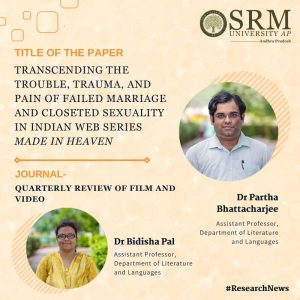 Dive into the realms of contemporary literature as our esteemed faculty members, Dr Partha Bhattacharjee and Dr Bidisha Pal from the Department of Literature and Languages presented their latest research endeavor. Their collaborative paper, titled “Transcending the Trouble, Trauma, and Pain of Failed Marriage and Closeted Sexuality in Indian Web Series Made in Heaven,” has found its home in the prestigious journal “Quarterly Review of Film and Video” (Scopus Q2).This scholarly exploration take into the portrayal of human experiences in the context of failed relationships and concealed identities within the framework of Indian web series. Join us in celebrating their insightful contributions to the literary discourse, reflecting SRM AP’s commitment to advancing knowledge and fostering academic excellence.
Dive into the realms of contemporary literature as our esteemed faculty members, Dr Partha Bhattacharjee and Dr Bidisha Pal from the Department of Literature and Languages presented their latest research endeavor. Their collaborative paper, titled “Transcending the Trouble, Trauma, and Pain of Failed Marriage and Closeted Sexuality in Indian Web Series Made in Heaven,” has found its home in the prestigious journal “Quarterly Review of Film and Video” (Scopus Q2).This scholarly exploration take into the portrayal of human experiences in the context of failed relationships and concealed identities within the framework of Indian web series. Join us in celebrating their insightful contributions to the literary discourse, reflecting SRM AP’s commitment to advancing knowledge and fostering academic excellence.
Abstract
Premiered as a television web series on Amazon Prime Video on 8th March 2019, Made in Heaven (2019) simultaneously unmasks the hypocrisies and lies of the big fat Indian weddings and breaks the taboo of homosexuality. In consecutive nine episodes, the plots and the subplots are beaded together to initiate a sensory sensitization towards the hypocrisy of marriages and insensitive homophobia. Carefully analyzing postulates from theorists this short article attempts to decode the trouble, trauma, and pain encoded in messy lifestyles, marriages, and relationships characterizing and wielding the lives as well as the sexuality of the characters in the web series
Explanation in Layperson’s Terms
The research revolves around the concept of marriage in Indian society as well as homosexuality in the Indian Hindi web series Made in Heaven (2019). The research shows how the various episodes of the web series showcase different aspects of marriage and the actual reality behind the pomp and pleasure of high-profile weddings within society. On the other hand sexuality and sexual desire are often hidden and do not get proper channelization in a person’s life. The desire thus remains suppressed and results in crisis in many forms. There are other intertwined concerns such as the dowry system, social disparity, impotency, virginity, and sexual molestations which weave a meta-narrative on the popular medium and raise consciousness regarding how people should react to those hazards and behave accordingly.
Practical Implementation and Social Implications of the Research
The research involves practical aspects such as the dowry system, social disparity, impotency, virginity, and sexual molestations which are part of our social lives. Many people have to face such things in their day-to-day lives. This research brings out such realities of society while analyzing the mental condition and psychology behind these. Moreover, this research also shows marriage is an important decision in a person’s life, it should be made in terms of love and respect, not based upon money and social status. The research visits practical examples and revisits the laws to substantiate the arguments. Popular media such as web series is not just a form of entertainment, but it can be a medium for building awareness.
- Published in English Current Happenings, News, Research News


